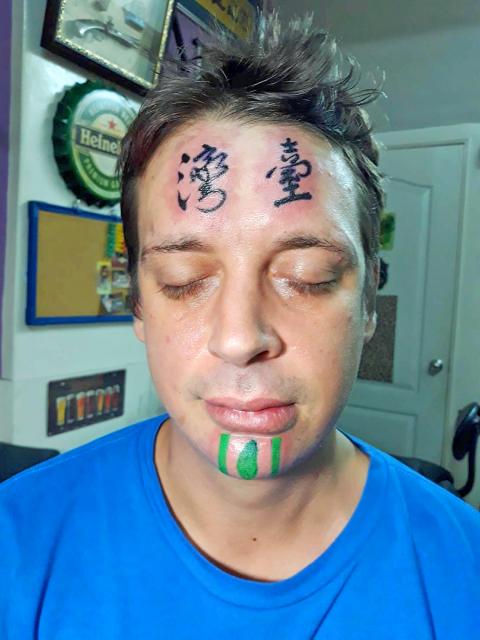A Briton living in Kaohsiung has become the talk of the town after appearing in public yesterday with the Chinese characters for “Taiwan” tattooed on his forehead, saying that he regretted having had it done while intoxicated.
Initial reports said the tattoo was the result of a misunderstanding between the tattooist and a foreigner, who was identified by some media as being British. The Briton reportedly visited a local tattoo shop on Friday after getting drunk and made what he later called a “rash decision.”
A tattoo artist posted a photo of the man’s face online on Saturday, saying that he came to his shop seeking ways to remove or modify the tattoo.

Photo courtesy of Wei Cheng
Because the tattoo covers a large area, the artist said he did not know how to modify the tattoo and turned to the Internet for help.
The post attracted mixed reactions. Some people criticized the person who tattooed “Taiwan” on the man’s forehead for lacking professionalism and ethical conduct.
The Briton was interviewed by reporters yesterday, saying he “felt embarrassed” and that it was a foolish decision that he regretted.
He has reportedly been living in Taiwan for 13 years with his Taiwanese wife and owns a bar in Kaohsiung.
However, the man who has been identified as the one who made the tattoo, Wei Cheng (韋丞), told reporters yesterday that there was no misunderstanding, saying that he had double-checked with the client, but that he had seemed sure about his decision.
“Though reeking of alcohol, the man spoke clearly and answered my questions without ambiguity. We discussed where he wanted to place the two characters before I asked him again, ‘Do you really want to tattoo it on your face?’ He insisted that was what he wanted,” Wei said.
It took him two hours to finish the job, Wei said, adding that the man seemed happy and satisfied with the results.
The Briton said that he was drunk at the time and did not know what he was doing, adding that his wife was furious.
However, he appeared certain of his love for Taiwan.
Speaking in Mandarin with reporters, he said he supports Taiwanese independence and that Taiwan belongs to neither China nor the Republic of China.
He also has a tattoo of a pro-independence flag on his arm — and chin.

CHANGING LANDSCAPE: Many of the part-time programs for educators were no longer needed, as many teachers obtain a graduate degree before joining the workforce, experts said Taiwanese universities this year canceled 86 programs, Ministry of Education data showed, with educators attributing the closures to the nation’s low birthrate as well as shifting trends. Fifty-three of the shuttered programs were part-time postgraduate degree programs, about 62 percent of the total, the most in the past five years, the data showed. National Taiwan Normal University (NTNU) discontinued the most part-time master’s programs, at 16: chemistry, life science, earth science, physics, fine arts, music, special education, health promotion and health education, educational psychology and counseling, education, design, Chinese as a second language, library and information sciences, mechatronics engineering, history, physical education

The Chinese military has boosted its capability to fight at a high tempo using the element of surprise and new technology, the Ministry of National Defense said in the Quadrennial Defense Review (QDR) published on Monday last week. The ministry highlighted Chinese People’s Liberation Army (PLA) developments showing significant changes in Beijing’s strategy for war on Taiwan. The PLA has made significant headway in building capabilities for all-weather, multi-domain intelligence, surveillance, operational control and a joint air-sea blockade against Taiwan’s lines of communication, it said. The PLA has also improved its capabilities in direct amphibious assault operations aimed at seizing strategically important beaches,

‘MALIGN PURPOSE’: Governments around the world conduct espionage operations, but China’s is different, as its ultimate goal is annexation, a think tank head said Taiwan is facing a growing existential threat from its own people spying for China, experts said, as the government seeks to toughen measures to stop Beijing’s infiltration efforts and deter Taiwanese turncoats. While Beijing and Taipei have been spying on each other for years, experts said that espionage posed a bigger threat to Taiwan due to the risk of a Chinese attack. Taiwan’s intelligence agency said China used “diverse channels and tactics” to infiltrate the nation’s military, government agencies and pro-China organizations. The main targets were retired and active members of the military, persuaded by money, blackmail or pro-China ideology to steal

The High Prosecutors’ Office yesterday withdrew an appeal against the acquittal of a former bank manager 22 years after his death, marking Taiwan’s first instance of prosecutors rendering posthumous justice to a wrongfully convicted defendant. Chu Ching-en (諸慶恩) — formerly a manager at the Taipei branch of BNP Paribas — was in 1999 accused by Weng Mao-chung (翁茂鍾), then-president of Chia Her Industrial Co, of forging a request for a fixed deposit of US$10 million by I-Hwa Industrial Co, a subsidiary of Chia Her, which was used as collateral. Chu was ruled not guilty in the first trial, but was found guilty